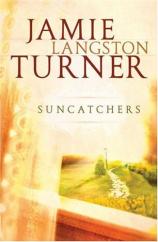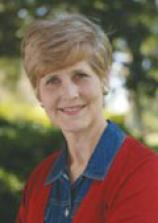Reading Group Guide
Discussion Questions
Suncatchers

1. Perry Warren admits to living the life of the observer. Does this make him better at his job of being a sociologist? What complications in his faltering personal life arise from this personality trait? Does this view about himself as observer change as the book progresses?
2. Marriage problems are at the heart of Perry’s move to Derby and at one point he wants desperately to warn a young couple about the “sad truth about marriage.” What is that “sad truth” he thinks he understands? Is it “truth”? What do his flashbacks about his interactions with Dinah reveal about their marriage? What are the most important lessons he learns from Brother Hawthorne about the real truth regarding marriage?
3. Perry is a man of contradictions. His wife complains about his lack of spontaneity and yet, in relation to his sister, he sees himself as the carefree child. Organization, particularly when it comes to his book, is a difficult thing for him. What is so complicated for him about organization? How does the “divine orchestration” of everyday events by God oppose everything he believes about how the world operates?
4. Eldeen is a larger-than-life character. In her presence Jewel, Joe Leonard, and Perry all appear small and quiet. Is this just her personality or something that she has learned or acquired over the years? Is there any point at which she is too overwhelming?
5. The book is quartered into four sections, each titled with a kind of light --- candlelight, firelight, starlight, and sunlight. How do the progression of section titles correlate with Perry’s time in Derby? Do you think that any of the characters appear that they might “burn out” as Perry wondered?
6. On his evening walk through his neighborhood, Perry begins thinking about “dividing lines and starting points”. Later, he tries to think back through his time at Derby, but isn’t able to organize his thoughts coherently enough. What do you think was the “starting point” of Perry’s conversion? Or, the dividing line that changed his thinking on being a husband? What was the dividing line in Jewel’s life? Is Perry’s philosophy correct in that there is one particular moment where things begin to change in a person’s life?
7. Perry arrives in Derby with preconceptions about the people and the culture he will explore. In what ways do the town and the people meet those notions? How do they defy them? Is it acceptable for a researcher to have preconceptions about his subject? How do generic terms like “Fundamentalism” feed predetermined viewpoints of people like Perry’s agent, Cal? What preconceptions exist today both about Christians and within Christianity about the secular world? How can these be broken down?
8. One of Perry’s quirks is the fear that he will suddenly open his mouth and say something ridiculous, or suddenly do something insane. What, in particular, is he worried about? How must being around Eldeen effect this fear? What happens the few times he does burst out (e.g. the auction)?
9. There is a constant play between broken-ness and wholeness. From the first scene where Perry watches Jewel sweep, many things are categorized as “broken” or “fixed”. How are Jewel and Perry alike in this sense? How is Perry used to “fix” so many things when so much else around him remains shattered? Besides his marriage, what else could he be referring to in his prayer for God to “fix this thing”? What still remains broken at the end of the book?
10. Jewel catches on much earlier than the rest to Perry’s intentions in Derby. Why doesn’t she confront him face-to-face? How would you characterize her interactions with other characters in the book? Are they all affected by the secret she’d held for so long? What is problematic with the question she asks herself before she speaks and what is useful in the question (i.e. “Are these the last words I want to say to a person?”)?
11. The snow globe becomes a central image in the book. Explain its significance to Perry and the subtle way it changes in meaning throughout the book. Who “shakes” Perry’s world the most throughout the book? Does fixing the snow globe really imply a fixed life --- or is there more to life than living in a sealed and secure world?
12. Two things Perry wants to witness in Derby are a wedding and a funeral? He sees the wedding but throughout the book seems to be preoccupied with death. Is this the natural preoccupation of a middle-aged man or something deeper? Dissect Perry’s conversation at the end of the book with Cal. How has his attitude toward death changed? How has Cal’s changed?
13. Joe Leonard speaks the least of any main character in the book. His words often leave a lasting impression on Perry though. What is the significance in relating to Perry as a “big brother”? Does that relationship really exist? How does Joe Leonard answer Cal’s demand for Perry to use the children of the church as a barometer?
14. “The supreme irony of it all,” Perry remembers Dinah saying at one point is that, “Perry Warren, the sociologist, the writer, the famous reporter of human behavior, has no clue about what’s underneath a relationship.” Is this a fair assessment by his wife? What lessons does he learn at Derby? Do you think he learns more about himself or other people? What is the true goal of any sociologic study?
15. At a number of points through the story, Perry gives interesting and sometimes unflattering, descriptions of himself. “Chief Field Mouse” is one. How does this differ with the self-description he gives during the Monopoly game? Which is closer to how he actually acts? How can he be an observer of the present when he’s constantly rummaging through old memories?
16. The title of the book is Suncatchers. With whom do the tiny objects correlate most closely? If you were to make a suncatcher for each character, what object would they be? Why is this the title of the book?
Suncatchers
- Publication Date: March 1, 2007
- Paperback: 400 pages
- Publisher: Bethany House Publishers
- ISBN-10: 0764202979
- ISBN-13: 9780764202971







